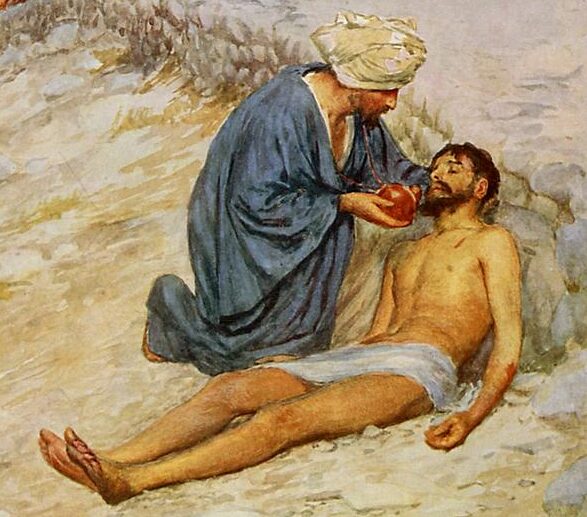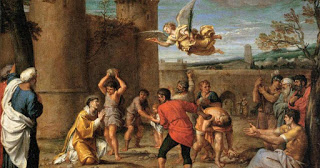What is love?
Love does not necessarily mean to feel good sentiments towards another person. Rather, to love is to will the good of another. This means we desire and act for the good for another person. And, in one of its purest forms, love is to will the good of your enemy.
An Example:
A prime example of this is described through Jesus’ parable of the Good Samaritan.
And behold, a lawyer stood up to put him to the test, saying, “Teacher, what shall I do to inherit eternal life?” He said to him, “What is written in the law? What do you read there?” And he answered, “You shall love the Lord your God with all your heart, and with all your soul, and with all your strength, and with all your mind; and your neighbor as yourself.” And he said to him, “You have answered right; do this, and you will live. But he, desiring to justify himself, said to Jesus, “And who is my neighbor?” Jesus replied, “A man was going down from Jerusalem to Jericho, and he fell among robbers, who stripped him and beat him, and departed, leaving him half dead. Now by chance a priest was going down that road; and when he saw him he passed by on the other side. So likewise a Levite, when he came to the place and saw him, passed by on the other side. But a Samaritan, as he journeyed, came to where he was; and when he saw him, he bound up his wounds, pouring on oil and brought him to an inn, and took care of him. And the next day he took out two denarii and gave them to the innkeeper, saying, “Take care of him; and whatever more you spend, I will repay you when I come back.” Which of these three, do you think proved neighbor to the man who fell among the robbers? He said, “The one who showed mercy on him.” And Jesus said to him, “Go and do likewise.” (Luke 10:25-37, RSV)
A Historical and Cultural Understanding:
To understand this parable, we must first consider the historical and cultural context of the story. Let us examine the places and people involved.
The road Jesus refers to in the parable was so dangerous and was so full of thieves and murderers, it became known as “The Way of Blood.” It was common for thieves and robbers to hide in limestone rocks near the road to attack travelers. It was also common for thieves to hide near those they had injured, hoping that some passerby would stop to help. The thieves and robbers would then attack those who stopped to assist the injured and rob them.
The man traveling from Jerusalem to Jericho is Jewish; he is traveling from one Jewish city to another Jewish city.
The Priests and Levites are Jewish leaders, the elite educated, well-versed in God’s commands. They may have not helped the half-dead Jewish man because they feared being injured themselves. They may have also feared the religious laws that would consider them to be ritually unclean should the Jewish man they were helping die. Should they become ritually unclean from touching a corpse, Jewish law would prevent them from being able to carry out their duties of serving in the Temple.
The Samaritans, however, were social outcasts and enemies of the Jews. The Samaritan who stopped to help the Jew had nothing to benefit. In fact, he had much to lose. If we recall the history of the road on which he was traveling, The Way of Blood, we know that he was risking his life. We must also keep in mind, that he was helping his enemy. The Jewish man may not have wanted the help of the Samaritan. After risking his life to robbers and Jews who may have witnessed his act of kindness, the Samaritan continues helping the Jew by traveling with him to an inn and sacrificing two denarii, which at the time, was the equivalent of two days wages. The Samaritan also promises to come back to check on the Jew and give more money should two days wages not be enough to buy the Jew what he needs to heal.
What This Means:
After considering the historical and culture facts, we come to know how radical the parable of The Good Samaritan is. Remember, Jesus is offering the parable as an answer to the question, “Teacher, what should I do to inherit eternal life?” (Luke 10:25). Once the parable is over, Jesus calls us all to “Go and do likewise” (Luke 10:37).
This means that to inherit the eternal life of Heaven, we must love like the Good Samaritan. Through this parable Jesus calls us to love our enemies by having the willingness to risk our lives for them, care for them, and sacrifice ourselves and our belongings for them. This is as radical as a black person today risking their life to help a wounded white supremist.
What This Does Not Mean:
This is not to say that we should suppress people and expect them to love us. No. We all need to love like the Good Samaritan. If everyone had the love of the Good Samaritan, we would have no enemies. There would be no social outcasts.
This also does not mean that we must give our all to every person we encounter who needs help. The Good Samaritan found himself willing and able to help the man on the road. He was willing to help and had the means to help. There are many examples of Jesus himself turning people away when he found himself exhausted from helping crowds of people. While it would be nice to be one hundred percent available to one hundred present of the people one hundred percent of the time, even Jesus, in his human form, shows us that this is not possible.
What Can We Do?
We Can Pray. We can ask God to help us love that person and we must also pray for them by asking God on their behalf to take their hatred away from them. We can ask God to teach them how love, and if we have the means and opportunity to help and interact with those that hate us, we can ask God to help us teach them how to love by loving them.
We Can Empathize. Those who act in hatred are often coming from a place of hurt. They often do not know how to love because they have not been loved themselves. By putting ourselves in their shoes, listening to them, hearing them out, we can better understand them. When we understand them, we know how to help them.
We Can Investigate Our Hearts and find where our hatred lies. Let us ask God to take our own hatred away and beg Him for the grace to love in the way Jesus tells us to love. Let us ask Him for the grace to love like the Good Samaritan.
For more information on the historical and cultural background of the Good Samaritan you can go here: https://www.massexplained.com/goodsamaritan/




Jacqueline the part of this story that is often looked over is that this was a demonstration of how one enters the Kingdom of Heaven. For Trinitarians and atonement theory Christians this does not demonstrate any confession requirement to be eternal with the father. A disposition of love in our heart to the extent we could even offer it to our enemy in a time of strife is where salvation is found. Practicing this in our current time is beyond difficult. So many feel justified in anger towards their enemy. So many feel justified in anger toward racist and bigots. How do we balance anger and peace so that love will abound and anger keeps its particular place on our journey. I find guidance in the story of the man they called Christ, for it was not a title we sought. I asked myself when did Jesus get angry? There are moments of aggravation at times but anger comes while in the Temple and upon witnessing the vendors and tax collectors. He loses it and shakes up the place. This is anger. This is a moment in which he is taking a stand against the way things are to make way for the way things can be. He draws a line in the sand. Yet, he does not stay there. He finds compassion in the healing of others. He finds eloquence in the teaching for others. He seeks justice for the ones others seek to judges. He offers water to quench the thirst that runs deep in our souls. However, he had made enemies in his anger. The Romans and the Jews would seek to convict this man and execute him as an enemy of the state. Things got hot and he knew what was coming, so he sought respite in Gethsemane. It is here that the iron reached its hottest point, but Jesus was no longer in anger and he did not strike back. Gethsemane is where Jesus knew he was about to experience a great injustice but he was not in anger. He was in pain and loneliness, but anger and a desire to fight was not his response. He surrendered to what must be. In his surrender, he found a way to love the ones with whom he could have been angry at. While the iron was hottest, Peter took out a weapon to strike. While the injustice was taking place, Jesus sought to heal the one who was being unjust. This is the great task of loving you enemy. Anger has its place on our journey. But, we must not stay there. What I can take from this story is that anger will come and have its way with me and I will act our. Yet, once the anger has erupted, and I let in pass, it will leave space for love to enter so that I may respond with that and practice this holy thing with the very thing I was angry with. In anger, we seek to change the one who made us angry, but we fail so often and nothing is accomplished. The lesson here is that anger is not the vehicle of true change. To love the one you are angry with will show a power greater than force, and speak to a deeper spirit in the one who hates you. You can speak to their hate with your love and the world just might be a better place.
Jacqueline,
A beautiful discussion about a story we have all read many times! Thank you.